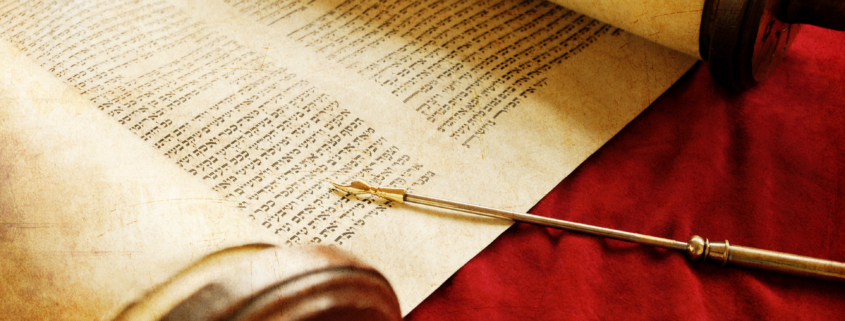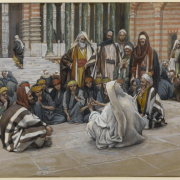Where is Messiah in the Hebrew Scriptures? Part I
According to the New Testament, the resurrected Yeshua was walking on the road with two of his disciples on Resurrection Sunday (Easter), and they didn’t recognize him. They were depressed that their rabbi had just been executed. So Yeshua replied to them:
“‘O foolish men and slow of heart to believe in all that the prophets have spoken! Was it not necessary for the Christ to suffer these things and to enter into His glory?’ Then beginning with Moses and with all the prophets, He explained to them the things concerning Himself in all the Scriptures.” (Luke 24:25–27, NASB95)
Don’t you wish you could have been there for that Bible study? Although Luke doesn’t narrate what Yeshua actually said, he is claiming that Yeshua is spoken of throughout the Hebrew Bible. So the question becomes, where exactly is he in the Hebrew Bible?
The Son of God is Everywhere in the Hebrew Scriptures!
Yeshua and the apostles give us good instructions for how to find the Messiah in the Hebrew Scriptures. I’m talking about more than messianic prophecies, that is, those places where the prophets declared what Yeshua would do in his first and second comings. No, I’m talking about places where the Son of God himself is actually present and acting in the events of the Hebrew Scriptures.
There is a fascinating passage written by Yeshua’s brother Jude that starts us in the right direction. Let’s read Jude 3–5:
“Beloved, although I was very eager to write to you about our common salvation, I found it necessary to write appealing to you to contend for the faith that was once for all delivered to the saints. For certain people have crept in unnoticed who long ago were designated for this condemnation, ungodly people, who pervert the grace of our God into sensuality and deny our only Master and Lord, Jesus Christ. Now I want to remind you, although you once fully knew it, that Jesus, who saved a people out of the land of Egypt, afterward destroyed those who did not believe.” (Jude 3–5, ESV)
Did you catch it? Jude is making a huge claim here. He is saying that Jesus was the one who saved Israel out of Egypt, and Jesus was the one who later destroyed the unbelievers in Israel’s midst. Jude intends us to understand that it was the pre-incarnate Yeshua who was actively involved during the Exodus.
Finding Yeshua in the Exodus
Now we need to go back to the book of Exodus and see where God says that he is present with the Israelites. Jude is telling us that those instances were the Son of God. Here are a few.
“The Lord was going before them in a pillar of cloud by day to lead them on the way, and in a pillar of fire by night to give them light, that they might travel by day and by night.” (Exodus 13:21, NASB95)
Who was that Lord? It was the Son of God. Here’s another passage:
“Then Moses went up with Aaron, Nadab and Abihu, and seventy of the elders of Israel, and they saw the God of Israel; and under His feet there appeared to be a pavement of sapphire, as clear as the sky itself. Yet He did not stretch out His hand against the nobles of the sons of Israel; and they saw God, and they ate and drank.” (Exodus 24:9–11, NASB95)
Moses and the elders saw God. Who did they see? The Son of God. And now let’s look at my favorite passage. God says to Israel:
“Behold, I am going to send an angel before you to guard you along the way and to bring you into the place which I have prepared. Be on your guard before him and obey his voice; do not be rebellious toward him, for he will not pardon your transgression, since My name is in him.” (Exodus 23:20–21, NASB95)
I’ll never forget the first time I read this passage and actually understood what it was saying. I was in the middle of seminary, reading through the book of Exodus, which I had read many times before. But all of a sudden, this verse stopped me in my tracks. I couldn’t believe what I had read. There was an angel—that is, a messenger in Hebrew—who had the very name of the Lord “in him.” Whoa, wait a second. How can anything have God’s name in him? Look at what the Bible says about the name of the Lord:
The Name of the Lord: |
||
| Is never to be blasphemed: Ex. 20:7, Lev. 24:16 | Is worthy of blessing: Ps. 113:2 | Brings salvation: Ps. 116:4 |
| Is worthy of praise: Ps. 7:17, Ps. 148:5, 13 | Empowers Israel: Ps. 118:10–11 | Enables prophecy: Deut. 18:22 |
| Is worthy of proclamation: Deut. 32:3 | Brings help to Israel: Ps. 124:8 | Is a place of refuge: Zeph. 3:12 |
| Is worthy of trust: Ps. 20:7 | Is worthy of fear: Ps. 102:15 | Is a strong tower: Prov. 18:10 |
The name of the Lord is holy, set apart, and is in a completely different realm than the created order. If there is a messenger sent by God to Israel who has the name of the Lord “in him,” then that messenger is divine. In that case, this is no mere angel sent by God—the messenger sent to Israel in Exodus 23 is actually the Son of God. Look back at the verse. It says that Israel must obey the messenger, and that the messenger “will not pardon your transgression.” That implies that the messenger has the power to forgive sins, but that is something that only God can do. In Daniel 9 we read,
“To the Lord our God belong compassion and forgiveness.” (Daniel 9:9, NASB95)
See, only God can forgive our sins. Just as Yeshua was forgiving sins to illustrate his divinity, so too this messenger in Exodus had the ability to forgive sins because he is divine. In fact, the messenger and Yeshua are the same person, the Son of God.
Yeshua as the “I AM” who Spoke with Moses
There’s one last example of Yeshua in the Exodus I want to highlight. When speaking to a group of his opponents, we read in John 8:58,
“Jesus said to them, “Truly, truly, I say to you, before Abraham was born, I am.”” (John 8:58, NASB95)
Now, in the Greek, just as in the English, this verse makes no grammatical sense. The correct grammar for this sentence would be, “Before Abraham was born, I was.” But that’s not what Yeshua said. He said “I am” – in the Greek, ego eimi. This is the same Greek phrase used by God in the Septuagint when he speaks to Moses from the burning bush in Exodus 3:14. God tells Moses that his name is
“Ἐγώ εἰμι ὁ ὤν” (Ego eimi ho on)
– translated as “I am the one who exists.” Yeshua is using the same phrase for himself, thereby claiming to be the God of Israel, even the one who was physically present inside the burning bush.
So in this article, we have seen that the Son of God was present with Israel during her exodus experience. The New Testament gives us concrete examples of Yeshua’s personal presence in the Hebrew Scriptures. His coming as a true flesh and blood human being was the culmination of Israel’s historical experience. They were not meeting the Son of God for the first time during Yeshua’s earthly ministry. Israel had interacted with him and even seen him before.





 Public Domain
Public Domain

